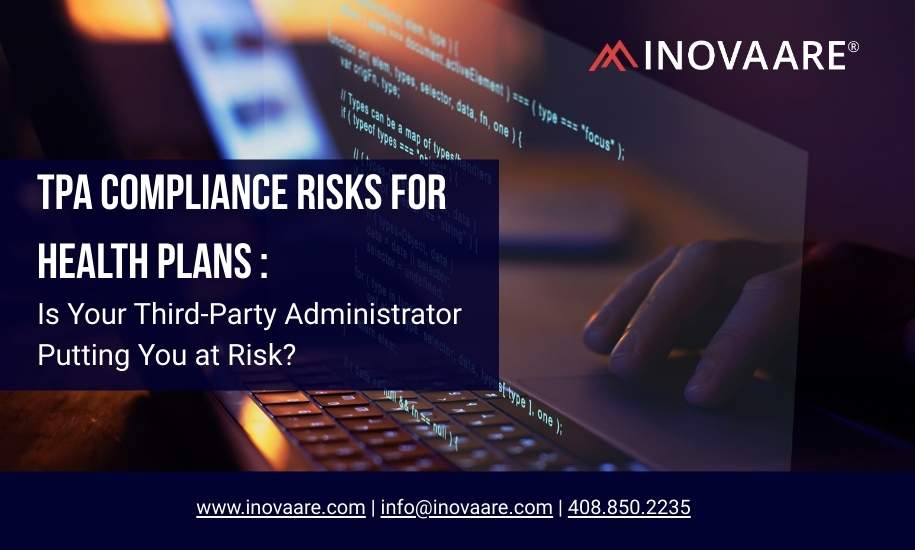For payers, entrusting essential functions to third-party administrators (TPAs) can alleviate the administrative burden and reduce operational expenses. However, this delegation introduces a compliance challenge: CMS holds health plans accountable for all delegated activities. Therefore, the compliance risks associated with TPAs for health plans are significant and require careful consideration.
If TPAs mishandle claims, appeals, utilization management, or credentialing, the plan, not the vendor, faces audit findings, corrective actions, and financial penalties.
This guide unpacks where TPAs create hidden risks, why oversight expectations are intensifying, and how health plan leaders can move from reactive monitoring to continuous Delegation Oversight.
Where TPAs create hidden risk
Data integrity gaps
Manual file transfers, siloed systems, and inconsistent formats can introduce significant errors into our processes. These data quality problems often become apparent during CMS Program Audits, leaving plans scrambling and struggling to explain and reconcile discrepancies that arise.
As a result, organizations may find themselves under scrutiny, needing to address not only the immediate inaccuracies but also the underlying issues. This can lead to inefficiencies and a loss of trust in data integrity, emphasizing the need for more streamlined and consistent data management practices.
Weak oversight controls
Relying solely on annual or ad hoc Third Party Administrator (TPA) audits is not enough to ensure compliance and operational efficiency. The Centers for Medicare & Medicaid Services (CMS) expects health plans to demonstrate a commitment to ongoing oversight through continuous monitoring and evaluation processes.
In addition, health plans must be able to provide well-documented and defensible audit trails that showcase their adherence to regulatory standards and best practices, ensuring transparency and accountability at all levels of their operations.
Missed SLAs
When Third-Party Administrators (TPAs) fail to meet required timelines for processing claims or handling appeals, the health plan ultimately absorbs the consequences of the Service Level Agreement (SLA) miss. Each delay not only affects operational efficiency but also significantly impacts member satisfaction.
Moreover, these delays expose the health plan to potential Star rating consequences, which can further diminish overall performance metrics and member trust. It is crucial for TPAs to adhere to their timelines to maintain high standards of service and uphold the integrity of the health plan.
Fragmented corrective actions
Corrective Action Plans (CAPs) managed separately by TPAs create blind spots. Without a centralized tracking system, regulators see inconsistency and lack of accountability.
Why this matters more in 2026
CMS and OIG are intensifying oversight of delegated entities:
- Universal audits: By 2026, CMS will audit all 550 Medicare Advantage plans annually, not just a sample. (CMS CERT)
- Improper payment exposure: In 2023, CMS identified $31.7 billion in improper payments in Medicare Fee-for-Service, a 7.66% error rate, illustrating the scale of data issues.
- Delegation spotlight: OIG reports repeatedly cite weak oversight of FDRs as a systemic compliance gap.
For payer compliance and operations leaders, this means oversight of TPAs is no longer a back-office function, it’s a board-level priority.
What health plans need: continuous delegation oversight
To protect members, compliance posture, and revenue, payer leaders need oversight systems that:
- Centralize TPA oversight in a single repository.
- Validate delegated files against CMS logic before they reach enterprise systems.
- Track SLAs in real time with alerts and escalation pathways.
- Link issues to CAPs with ownership, due dates, and closure tracking.
- Provide dashboards that give executives visibility across all delegated entities.
How a digital platform changes the game
A digital-first Delegation Oversight platform transforms TPA management by:
- Enabling secure repositories for all delegated contracts, files, and compliance attestations.
- Automating file scrubbing and exception reporting for claims, UM, and credentialing universes.
- Running delegation audits with configurable workflows and defensible documentation.
- Monitoring SLA adherence and CAP progress across all TPAs and delegated functions.
- Leveraging AI copilot to highlight anomalies, repeat issues, and emerging risks.
This shifts oversight from reactive vendor management to proactive compliance governance.
Don’t let TPAs/Vendors define your risk profile
Delegating functions does not delegate accountability. While it may seem convenient to assign certain responsibilities to third-party administrators (TPAs), it is crucial to understand that the CMS holds health plans fully responsible for every delegated action. This accountability extends to any missed Service Level Agreements (SLAs) and any findings from audits.
If your oversight of these delegated functions is limited solely to annual reviews and reliance on manual checklists, you are inadvertently exposing your organization to significant risks. It is essential to implement a more robust oversight strategy to ensure that your TPAs are fully compliant and that all processes are closely monitored. Failure to do so could lead to dire consequences for your health plan, impacting both operational effectiveness and financial stability.
The answer is a continuous, digital-first Delegation Oversight approach. With Inovaare’s platform, payers gain control, transparency, and compliance confidence across all delegated entities.
See how Inovaare’s Delegation Oversight Suite transforms TPA oversight from reactive to proactive.
Schedule a demo today.
